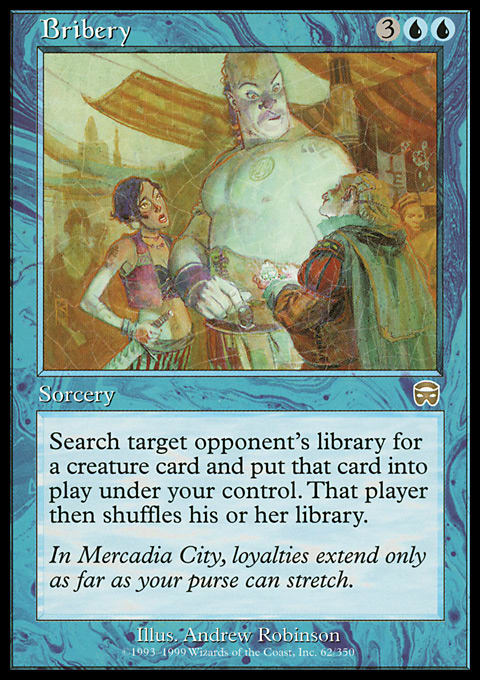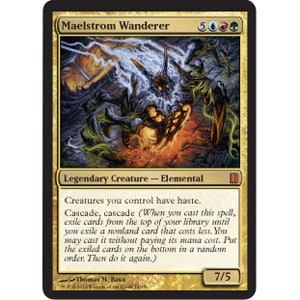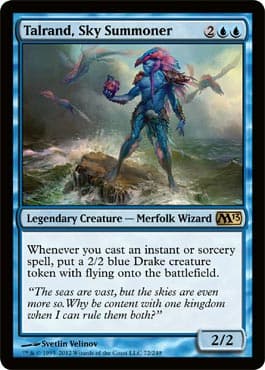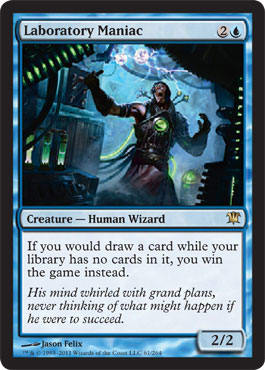Welcome back, readers!
It's been quite a while since I embarked on this endeavor, and it's been a wild ride. I have had a lot of people tell me that this whole 75% endeavor (Project? Ethos? Guidelines?) has been instructive to them during the deck-building process and has helped them be a part of a community a little better with respect to how they play Commander. I think that's great! The whole point of the 75% project is to get people playing a social game in a social manner and making sure they integrate well into any group. While most Commander players have a regular group, I play a lot of games with a lot of new groups because I travel so much in my role as a Magic financier. I'm constantly visiting new shops and new groups and meeting new people at Grand Prix and other events.
Back in February, I set out to answer the question, "Can we build a deck that is good in any situation?" The idea to start a series based on that notion spawned from a conversation with Adam Styborski and can be found at this link. Soon after, I was writing a regular article series trying to tackle the issue.
Nearly on a weekly basis, someone asks about the theory, and the article I send that person is the first one that I felt was a good introduction to the theory. This first article laid out my intentions from the project, my reason for starting it, and the first founding principle of 75% deck-building—namely that "scalable" spells were a good way to make sure your deck can match the power level of the other decks you're playing against. As more and more people asked about the theory, that was the article I sent them. I have seen it referred to as "the article" about 75% Commander, and people who have read it have commented that they wish the article went into more depth, missing the fact that it's been an ongoing series for almost a year.
In a lot of ways, that prompted today's article. I was considering waiting for February to do a one-year retrospective, but I it's important to have a codification of the things we've learned thus far. If there is one article I want people to read about 75% Commander, why would it be the very first one, when I've spent the last ten months learning about what works and what doesn't? It's time to see if I can't help list some of the tenets of 75% deck-building and talk a bit about what I've learned in the course of the series. That way, if someone only reads one article about the 75% theory, and it's this one, that person will end up with a much better idea of what's going on.
The first article I wrote, as I said, I talked about scalable spells (spells like Bribery and Control Magic) and how they have different power levels against different decks, and we briefly touched on shooting for winning 1 ÷ X games, where X is the number of players at the table. I think these hold up, and I like the first rule.
- Scalable spells help tailor your cards to the power levels of your opponents' decks.
The next article in the series dealt with the use of tutors very judiciously and made me realize that face-up tutors are much more social than face-down tutors, which tend to make other players nervous. Really, I think the most salient part of the article and the thing that most people who claim not to like this ethos get totally wrong is that you should start with an underpowered deck and scale it up to beat better decks, not weaken a strong one. Maybe I should have spent the last nine months making people read the second article instead of the first; I'd probably have a lot fewer detractors that way! Still, this article was a good one and taught me as much about 75% as it did anyone else.
- Always start weak and improve the deck—never weaken a better deck.
The third article in the series continued my trend of having an epiphany every time I looked at one of my decks and thought about what I liked about how it played out. While I didn't have a principle to build on every week, the first few months were very instructive. I thought about how I would win through chance a lot with Maelstrom Wanderer (a deck I've since made foily, 100%, and brutal!) and how being overpowered could be okay if you didn't do it consistently.
- You can skew toward power, provided you skew away from consistency.
We were off to a good start coming up with guidelines to help our readers build!
The next week, a redditor sent me his Erebos, God of the Dead decklist, and the resulting article dealt with how I liked cards like Painful Quandary and its ilk in a 75% deck rather than cards that made enemies discard a ton of cards or blew up lands. 75% decks are about letting people do their things—to an extent—but not letting them win with that thing if we could prevent it! We made a new rule.
- It is better to punish everyone equally for doing something rather than prevent someone from doing it.
We were well on our way to coming up with a list of guidelines.
You make a deck more your own and less like everyone else's, and you're well on your way to building a 75% deck in my view. If 100% is the idealized version of the deck, most people will agree on that build. You can avoid falling into that trap by shrinking your card pool. You don't remove the best cards from the pool to make the deck “bad,” but rather, you shrink the pool in some novel way, forcing you to become creative. The next article dealt with thematics and how you could build along a theme, allowing you to play the most broken and powerful cards within that theme and still have a 75% deck because you didn't give yourself access to every card ever.
- Building around a theme will keep the power level from skewing too high.
Theme-based decks weren't the only way to narrow your card pool, and the next article went more in depth about how to impose some limitations to make you build more creatively. This was pretty similar to the previous rule, but I came to the conclusion independently and like what it said about how I build.
- Imposing limitations encourages creativity and promotes balance.
As for the next few articles, I felt they were good, but they were more focused on applying the principles we had come up with to help tune existing decks. We helped a Talrand, Sky Summoner player use our thematic approach to make a Drake tribal deck that didn't make his wife cry, but we didn't learn much about the 75% theory. I took a stab at using those rules as a basis for a Kruphix deck, and the finished product looked pretty good. Maybe there was something to this after all. I started to grow bored when I realized how seductively easy it would be to just make every unfair commander tribal or Voltron to make sure we didn't end up building everyone else's decks. I wanted to challenge myself a bit, even if that meant attempting to find the boundaries of the rules we had and not make new ones.
After a while, I decided we needed a new principle because people were unsure about how to deal with certain cards. An article about how narrow counterspells like Hindering Light were perfect because they could make sure you won but didn't really stop others from doing their own things led me to think about countermagic differently and try to come up with a guideline for its use—as well as for cards like Nevermore.
- Do what you need to do to protect the execution of your strategy.
After a few more weeks of looking at others' decks and coming up with a few of my own, I had a conversation with Jason Rice, the author of the Unified Theory of Commander series on BrainstormBrewery.com. Jason and his story about how his Roon of the Hidden Realm deck overperformed slightly was good for a few articles, and ultimately, we came up with a good test of a new deck. At the end of the game, ask yourself two questions.
- “Can I beat almost anyone if I am a bit lucky and play tight?”
- “Can almost any reasonable deck beat me if the opponent is a bit lucky and plays tight?”
Answering these honestly can serve as a decent acid test for a 75% deck.
If you only read two articles about 75% deck-building and one of them is the first one and you refuse to read the one you're currently reading because we're speaking hypothetically and that can be confusing, the second one I'd want you to read is the one about homogeneity. Wanting a varied game experience is something the 75% deck strives for. You can win in a powerful manner if you don't do it super-consistently, you can win in a flashy manner if you don't do it early, and you can have more fun if you don't try to win the same way every time. This is one of the reasons I tend to stray away from decks with Laboratory Maniac in them—what incentive do you have no to try to deck yourself? To that end, I wanted to avoid too much card-draw. We came up with a few rules in this article, but really, only the first applies.
- Try to vary the game experience, and build with multiple paths to victory in mind.
- Play tutors or card-draw, but not both.
Around this time, I wrote a few more articles about others' decks and then was able to brew with cards from the new From the Vault: Annihilation and Khans of Tarkir.
Very recently, I've come to terms with how I feel about targeted land destruction; then, the next week, it was mass land destruction. We've come a long way in this series!
Let's put all of our axioms, finally, in one spot.
- Scalable spells help tailor your cards to the power level of your opponents' decks.
- Always start weak and improve the deck—never weaken a better deck.
- You can skew toward power provided you skew away from consistency.
- It is better to punish everyone equally for doing something rather than prevent someone from doing it.
- Building around a theme will keep the power level from skewing too high.
- Imposing limitations encourages creativity and promotes balance.
- Do what you need to do to protect the execution of your strategy.
- Try to vary the game experience, and build with multiple paths to victory in mind.
There you have it: eight guiding principles to help you build a 75% deck of your own. If you want to go back and read everything, I welcome it, but I hope this list is enough for now. I am sure we'll add to it later on, but for now, I'm really happy with how this series is going, and I hope we keep adding to it bit by bit, and I hope next December we can call another huddle and talk about all we've learned. Thanks for reading and supporting. I couldn't have done it without you!

































